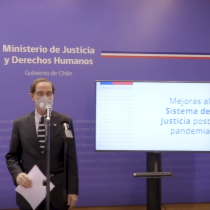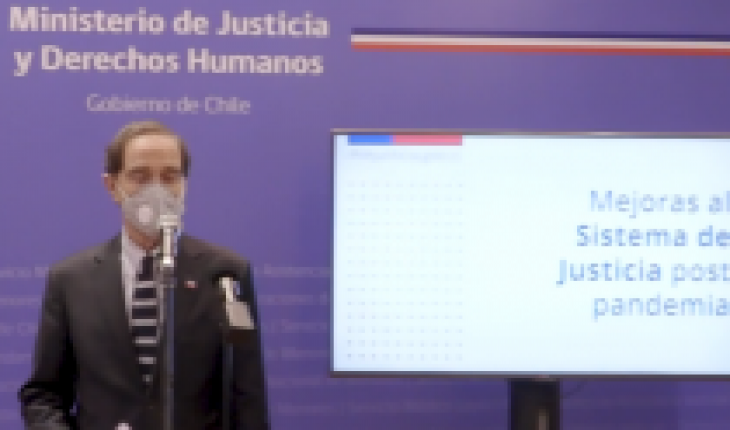
This morning the Minister of Justice and Human Rights, Hernán Larraín, together with the Under-Secretary of Justice, Sebastián Valenzuela, presented the “Plan of Actions to Face Future Normality”, which includes proposals in the field of criminal, civil, commercial, labor and family justice.
Law 21.226, promoted by the Government, allowed hearings to be suspended, deadlines extended, and the Supreme Court empowered to adapt judicial processes to the reality of confinement and movement restriction required by the pandemic. Without prejudice to this, new themes are observed for the near future, once the State of Exception is completed.
On the one hand, the system is expected to be overloaded for the second half (and eventually 2021), as a result of the current suspension of hearings and the delay of legal proceedings. In addition, there is a need to adapt the justice system to “future normality”, taking advantage of the lessons and improvements to the system that leaves this experience, such as videoconferencing.
To address these issues, two working groups will be formed: one in the field of Criminal Justice, and one in matters of Civil Justice, which will act in parallel, within the same time limits, whose purpose will be to deliver proposals to resolve in advance the difficulties that arise in the return of the functioning of justice.
It will be the Ministry of Justice and HRD to coordinate both working groups and develop the law initiatives that the Executive will propose to the National Congress, within a period of not more than 45 days.
In this regard, Justice Minister Hernán Larraín explained that “the background that we have, and which is already taking place today, speaks of a kind of foreseeable congestion towards the future, for the number of legal proceedings that have been suspended and that will be reactivated, once we have the full restoration of our country”.
“We have some ideas that are already being discussed to resolve in criminal matters as it says regarding modifications in abbreviated procedures, changes in the ways of making the evidentiary terms, what to do when the trials are annulled to see if the whole process needs to be repeated or we can do something more simplified or partial. And certainly, in the civil sphere, we also think that this is an opportunity to rethink certain matters such as, for example, we can incorporate bodies such as conciliation mediations or procedures that make judicial decisions faster and more effective by means not necessarily so formal and structured,” the Secretary of State concluded.
Details of the work on Criminal Justice:
According to figures known during the Coordinating Committee of the Criminal Justice System, in the Guarantee Courts, although proceedings have been continued during this period, despite the confinements, the number of hearings not held – from 16 March to 31 May – exceeds 90 thousand cases. And in the case of the Criminal Oral Courts, the pending hearings reach 3,663, in the same period.
For this reason, the Coordinating Commission of Criminal Justice agreed on Monday, 8 June to form a working group, composed of the President of the Supreme Court (which will be represented by Minister Manuel Antonio Valderrama), the National Prosecutor, the Minister of Justice and Human Rights, the National Defender and the Bar Association. It will incorporate two experts and consult academic centres and associations of the various institutions.
Details of work in civil, commercial, labor and family justice:
This ministerial portfolio proposed to the Supreme Court a joint working table to address civil issues. It was adopted by decision of the Plenary of the Supreme Court, dated 2 June 2020, with Minister Rosa María Maggi appointed to participate in that instance.
The methodology for developing this plan will consider participatory meetings with experts and system actors, and data and information collection of the sector.
For this reason, the Ministry of Justice and Human Rights, together with the Judiciary, will constitute a working table, during the month of June, composed of the State Defense Council, the Bar Association and Judicial Assistance Corporations, as well as invite others to participate in hearings andacademic centres, judges and trade union associations of the related institutions, who must submit a proposal in a maximum of 45 days.





